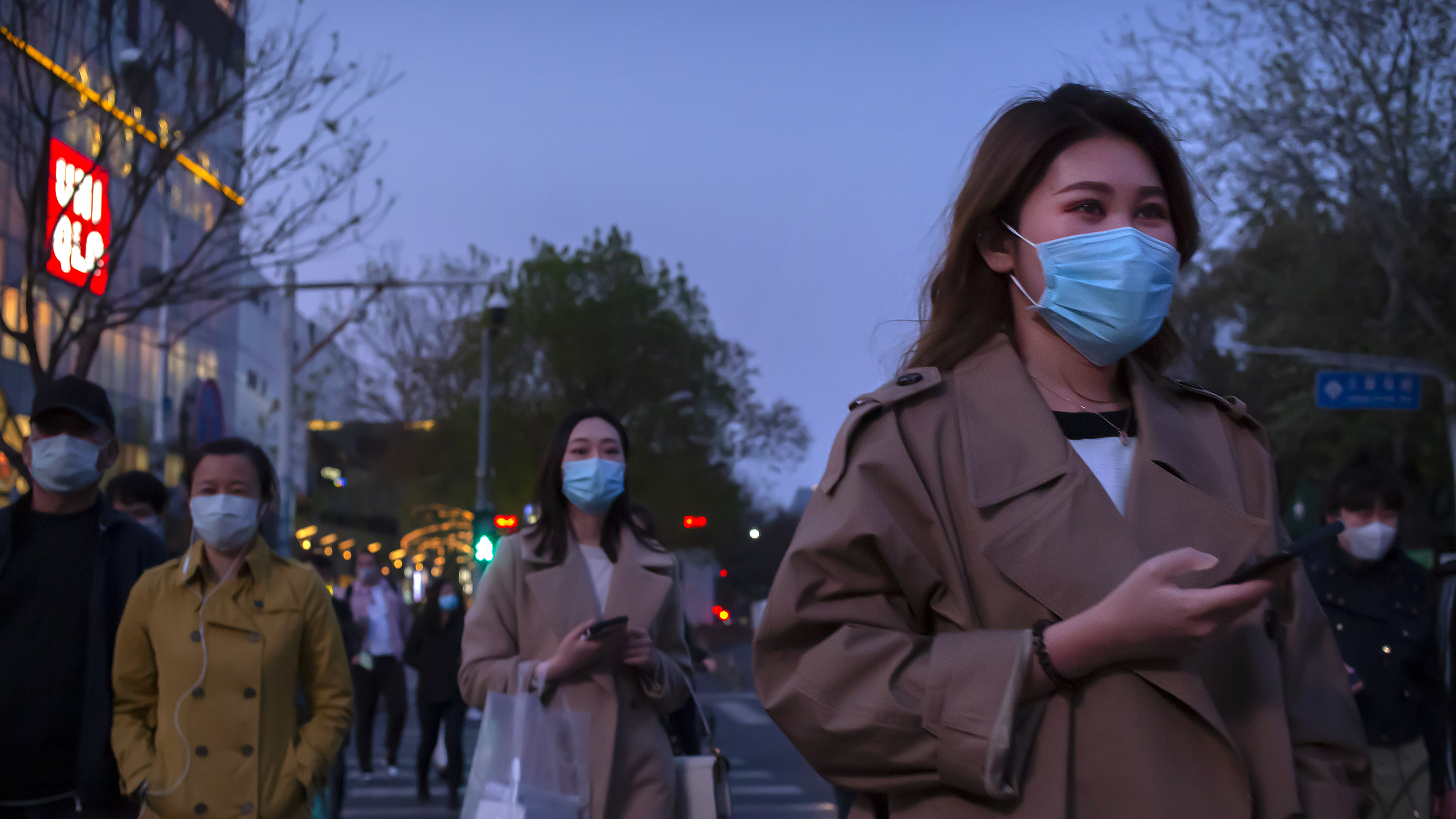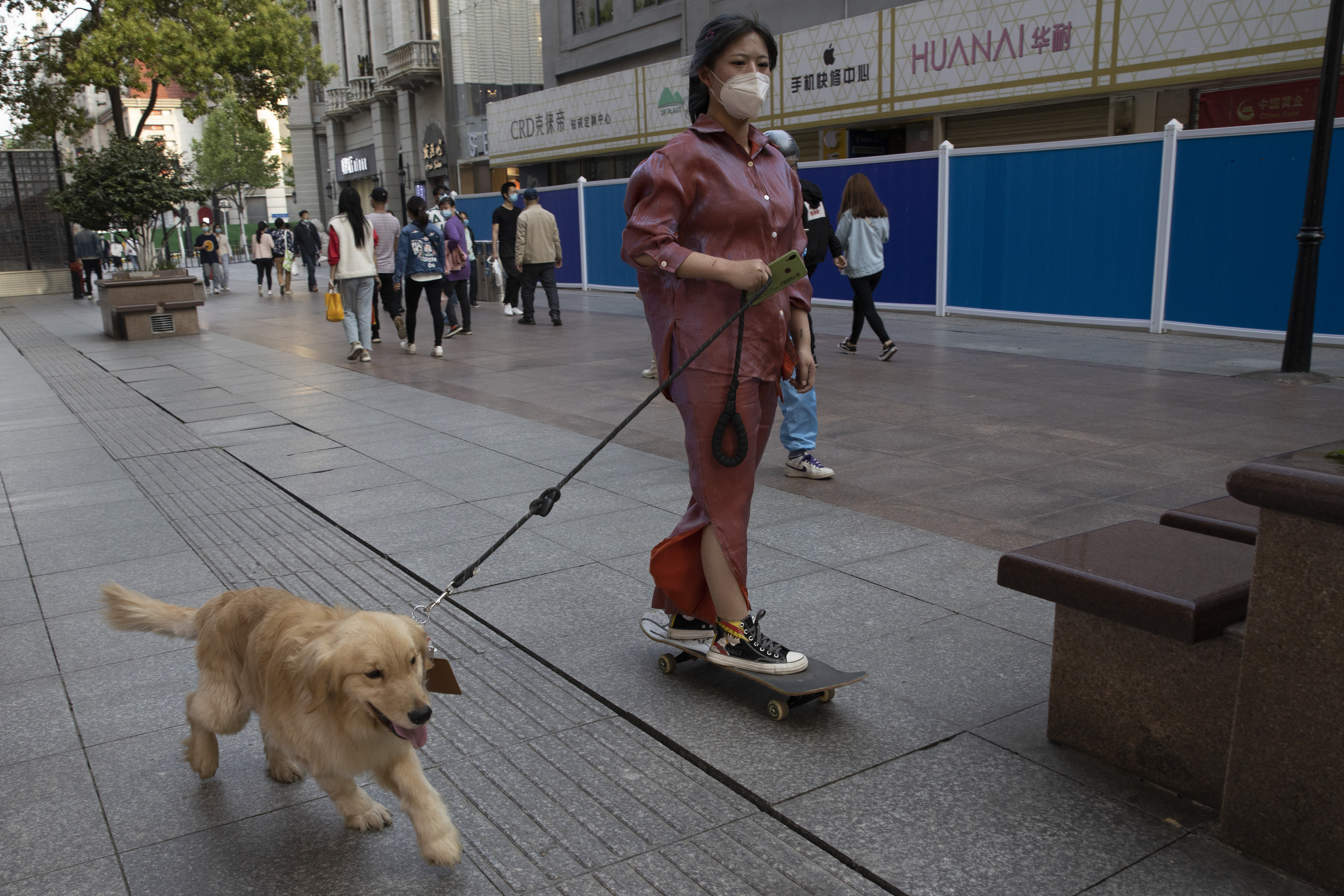
People wear face masks to help curb the spread of the new coronavirus as they cross an intersection in Beijing, Friday, April 10, 2020. /AP
People wear face masks to help curb the spread of the new coronavirus as they cross an intersection in Beijing, Friday, April 10, 2020. /AP
Editor's Note: Huo Zhengxin is a professor of law at the China University of Political Science and Law. The article reflects the author's opinions, and not necessarily the views of CGTN.
As of now, the COVID-19 pandemic has spread to almost all countries and regions around the world, causing unprecedented disruptions in the economic, political, and social life of billions. The scale of the damage has prompted arguments in some Western countries that China should bear international legal responsibility for the pandemic and should compensate countries harmed by the outbreak. Some even threatened to take China to the International Court of Justice or other international tribunals and warn China that "the lawyers are coming" and "the claims could be at least in the trillions."
Though I don't believe that such arguments represent the mainstream public opinion in the West, they have stirred confusion and even a certain degree of anxiety when cooperation and unity are badly needed as the world has reached a critical moment in the fight against COVID-19. For this reason, I think it is necessary to give a response and an analysis from the perspective of international law.
First of all, I have to state that none of the existing international conventions addressing the transboundary spread of infectious diseases contain rules requiring payment of compensation for damage in other countries associated with violations of convention rules.
The reason is self-evident: Virus and infectious diseases know no borders and distinguish no races, which may appear and break out in any country. Therefore, requiring a country where the epidemic initially started to pay compensation for damage in other countries involves challenging scientific, public health and political questions.
For example, though the origin of the calamitous 1918 influenza pandemic remains unknown, the U.S. is certainly on the list of potential countries of origin. The 2009 H1N1 pandemic was first identified in the U.S.. This reality creates a shared interest and a common ground among states not to seek reparations for the damage they suffered as a result of such pandemics. Therefore, the arguments that China bears an obligation under international law to compensate foreign countries for the damage of COVID-19 ignore international law as well as common sense.
Second, China did not violate the International Health Regulations (2005) (hereafter as IHR). The arguments that China is legally responsible for COVID-19 damage are largely based on the allegations that China failed to inform the WHO about the viral outbreak quickly (Art.6) and to provide "timely, accurate and sufficiently detailed and available public health information" about it (Art.7). Nonetheless, a retrospective examination suggests that China has fulfilled its obligations under the IHR.
In late 2019, the Wuhan CDC detected cases of pneumonia of unknown cause. On December 31, 2019, China's National Health Commission (NHC) sent an expert team to Wuhan. On January 2, China CDC received the first batch of samples of four patients from Hubei and began pathogen identification. Starting January 3, China has been regularly informing the WHO, and foreign countries concerned, including the U.S., about the pneumonia outbreak.
On January 9, an expert team from the NHC made public the existence of the pathogen, saying a new type of coronavirus was initially identified as the cause of the viral pneumonia in Wuhan. On the same day, China informed the WHO about the epidemic, sharing with the WHO the initial progress in determining the cause of the viral pneumonia in Wuhan. On January 11, Chinese scientists shared the genetic sequence of the virus internationally, at an unprecedented speed.

A resident gets a ride from her dog along a retail street in Wuhan in central China's Hubei province, Thursday, April 9, 2020. /AP
A resident gets a ride from her dog along a retail street in Wuhan in central China's Hubei province, Thursday, April 9, 2020. /AP
What's more, accusing that China has violated the IHR would have to navigate how the WHO has evaluated China's performance. Since January, the senior officials of the WHO have repeatedly praised China's leadership for its "openness to share information" with the international community. Though the WHO is not entitled to decide how states and parties interpret the IHR, the IHR itself gives the WHO such prominence and authority that its actions in this context can by no means be ignored.
Third, China does not bear state responsibility under customary international law. Customary international law on state responsibility holds that a state violating international law has an obligation to make full reparation for the injury caused by the internationally wrong act, which is reflected in the 2001 Draft Articles on the Responsibility of States for Wrongful Acts.
Points worth noting are the following: (1) This customary rule, so far, has played little, if any, role in the spread of infectious diseases over the long history of international health cooperation. (2) The state responsibility is premised on "a causal link" between the alleged breach of an international obligation and the damage suffered by the injured States. However, no evidence has been found to demonstrate that the causation requirement has been satisfied. Conversely, the efforts made by the Chinese government has effectively postponed the international spread of the virus.
Since January 23 to April 8, the city of Wuhan had been locked down for 76 days to contain COVID-19. It is widely believed that this world's largest-known quarantine has slowed the spread of the virus to the rest of the world by at least two or three weeks at the enormous sacrifice of China's own economy. For this reason, Tedros Adhanom Ghebreyesus, WHO director general, stated that China "has bought the world time" regarding the COVID-19 prevention.
Last but not least, state sovereignty is the basic principle of modern international law which means that a state may not be compelled to appear before an international court or tribunal without its consent. Therefore, any effort to take China to international tribunal for COVID-19 pandemic is nothing but a fruitless exercise.
Simply put, any scholar or practitioner with the basic knowledge of international law would have taken one look at the headlines about these allegations and immediately draw the conclusion that such allegations by reference to international law is not taking international law seriously.
(If you want to contribute and have specific expertise, please contact us at opinions@cgtn.com.)